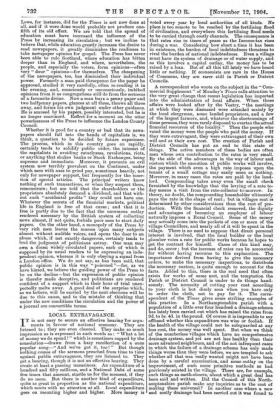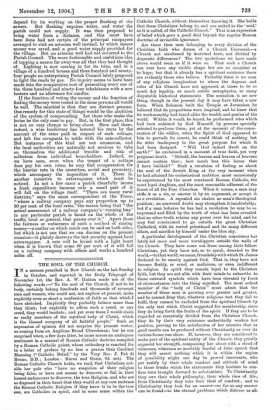voted every year by local authorities of all kinds. No
place is too remote to be reached by the fertilising flood of civilisation, and everywhere this fertilising flood needs to be carried through costly channels. The consequence is that rates rise in times of peace as the Income-tax rises during a war. Considering how short a time it has been in existence, the burden of local indebtedness threatens to rival the burden of national indebtedness. Even a village must have its system of drainage or of water supply, and as this involves a capital outlay, the money has to be raised by a loan. But of all this till lately we have heard little or nothing. If economists are rare in the House of Commons, they are rarer still in Parish or District Councils.
A correspondent who wrote on the subject in the " Com- mercial Supplement " of Monday's Times calls attention to the very great change that recent legislation has imported into the administration of local affairs. When these affairs were looked after by the Vestry, "the meetings at which they were discussed were attended mainly by the local clergyman, some landed proprietors, and a few of the largest farmers, and, whatever the shortcomings of these persons, they were rarely disposed to overtax the actual financial resources of the locality." Then the people who voted the money were the people who paid the money. If they were extravagant, they were extravagant of their own will and at their own cost. The creation of Parish and District Councils has put an end to this state of things. The active members of these bodies are often men whose own contribution to the rates is very small. By the side of the advantages in the way of labour and custom which the execution of public works will involve, the payment which even a high rate imposes upon the tenant of a small cottage may easily seem as nothing. Moreover, in many cases the rates are paid by the land- lord. Compounding takes away even the small check furnished by the knowledge that the levying of a rate to- day means a visit from the rate-collector to-morrow. In theory, no doubt, the compounding householder ultimately pays the rate in the shape of rent ; but in villages rent is determined by other considerations than the cost of pro- duction. With the financial check removed, the dignity and advantages of becoming an employer of labour naturally impress a Rural Council. Some of the money may actually come into the pockets of one or more of the village Councillors, and nearly all of it will be spent in the village. There is no need to suppose that direct personal interest is involved, that the local builder or the local plumber votes a rate for public works because he hopes to get the contract for himself. Cases of this kind may, and do, occur ; but the increase of rates can be accounted for without having recourse to this explanation. The importance derived from having to give the necessary orders, to make the necessary inspections, to distribute the necessary custom, is quite enough to account for the facts. Added to this, there is the real need that often exists for works of some sort, and the temptation the Parish or District Council is under to do things hand- somely. The necessity of cutting your coat according to your cloth is but dimly seen when you have only to order the cloth, not to pay for it. The corre- spondent of the Times gives some striking examples of this practice. In a Northamptonshire parish with a population of a little over four hundred a drainage scheme has lately been carried out which has raised the rates from 9d. to 5s. 4d. in the pound. Of course it is impossible to say offhand whether this expenditure was wise or foolish. If the health of the village could not be safeguarded at any less cost, the money was well spent. But when we think of the numberless villages which have no comprehensive drainage system, and yet are not less healthy than their more advanced neighbours, and of the not infrequent cases in which the failure of a drainage scheme has only made things worse than they were before, we are tempted to ask whether all that was really wanted might not have been done by a careful examination, and some outlay on the improvement, of such more primitive methods as had previously existed in the village. There are, for example, such things as earth-closets; about which a great deal has been said and written. Did the Council of this North- amptonshire parish make any inquiries as to the cost of making these universal ? In another case where a new and costly-drainage had been carried out it was found to depend for its working on the proper flushing of the sewers. But flushing requires water, and water the parish could not supply. It was then proposed to bring water from a distance, and this must have been done had not certain of the principal ratepayers arranged to sink an artesian well instead, by which means money was saved, and a good water supply provided for the village. But an artesian well bad not occurred to the Parish Council. The more fashionable and ambitious idea of tapping a source far away was all that they had thought of. Lighting is now coming in for its turn, and in a village of a hundred houses and three hundred and ninety- four people an enterprising Parish Council lately proposed to light the roads by gas. No inquiry seems to have been made into the comparative cost of presenting every one of the three hundred and ninety-four inhabitants with a new lantern and an allowance for candles.
If the function of voting the money and the function of finding the money were vested in the same persons all would be well. The mischief is that they are distinct persons. One remedy for this state of things would be the abolition of the system of compounding. Let those who make the levies be the only ones to pay. But, in the first place, this is not an easy change to bring about. Here and there, indeed, a wise landowner has lowered his rents by the amount of the rates paid in respect of each cottage, and left the occupants to 'settle with the rate-collector. But instances of this kind are not numerous, and the local authorities are naturally not anxious to take on themselves the additional trouble and risk of collection from individual householders. Indeed, as we have seen, even when the tenant of a cottage does pay his own rates, he may find compensation for the heavier rate in the amenities, social and pecuniary, which accompany the imposition of it. There is, another incentive to extravagance which must be noticed. In not a few cases a parish cheerfully incurs a fresh expenditure because only a small part of it will fall on the village itself. " There are many rural districts," says the same correspondent of the Times, " where a railway company pays any proportion up to 80 per cent. of the local rates," the reason being that " the actual assessment of a railway company's running line' in any particular parish is based on the whole of the traffic, local or general, that passes over it." Apart from the fairness or unfairness of such a method of raising money—a matter on which much can be said on both sides, but which is not one that we can discuss on the present occasion—it plainly destroys the last security against local extravagance. A rate will be levied with a light heart when it is known that some 80 per cent. of it will fall on a railway company with offices and works a hundred miles off.
THE SOUL OF THE CHURCH.











































 Previous page
Previous page